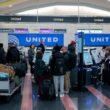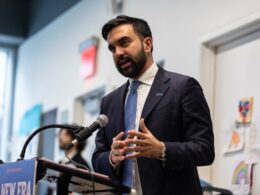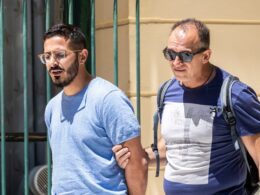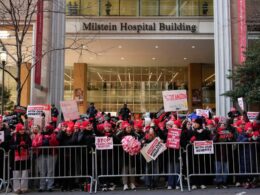This year’s NYC mayor’s race is all about affordability, yet the candidates have given short shrift to the single biggest factor that impacts a person’s quality of life — education, which must be addressed in this evening’s first debate of the general election.
Our public schools educate nearly a million students who are going to enter a workforce vastly different from the one we know today. Voters need to know how the next mayor plans to prepare students. Further, as a driver of the public good, education belongs at the center of the conversation. Strong schools determine the strength of our workforce, the stability of our neighborhoods, and the health of our civic life.
The city is already experiencing the impacts of a changing economy. Job growth in New York has slowed, and industries are being reshaped by artificial intelligence. According to the city Office of Management and Budget, since the start of the year, New York has seen the slowest positive job growth during the first seven months of any year since 1995. At the same time, employers are adopting AI tools that are redefining work across sectors — from logistics and health care to finance and creative industries.
Recent college graduates face one of the toughest job markets since 2015, with unemployment at 5.3% versus 4% overall, according to the New York Fed. The city’s future depends on graduates who are ready to harness new technologies and industries.
The public schools have long recognized the value of cross-sector partnerships as it relates to workforce preparation. They have introduced career pathways for students that include work-based learning in high-demand industries. I see the benefits of these kinds of partnerships every day at Teachers College as our students gain hands-on experience working in pre-K to 12 classrooms across the city, acquiring the skills needed to prepare our future leaders.
While the mayoral candidates have put forward policy proposals ranging from early-childhood programs to vocational training to teacher and parent empowerment, voters are still lacking a cohesive vision for how these proposals translate into real pathways from classroom to career.
Many schools are still struggling with pandemic learning loss, and chronic absenteeism. Shortages of counselors, social workers, bilingual educators, and special education staff leave students without the support they need. In many neighborhoods, facilities remain outdated, from aging infrastructure to limited access to technology.
Certainly, the candidates differ in their approaches to addressing these challenges. Andrew Cuomo argues for continuing mayoral control of schools, while Curtis Sliwa calls for new oversight, and Zohran Mamdani proposes decentralizing authority. What matters most for families, however, is not the structure itself but whether it produces better results. New Yorkers should press each candidate to explain how their approach to governance will guarantee that resources and reforms actually reach classrooms.
No governance model or policy shift will succeed unless the next mayor makes a serious investment in the teachers and staff who carry the work forward every day. At Teachers College, we are preparing the next generation of educators, counselors, psychologists and nutritionists to support this next-generation learning, but their training is only as good as the support they find once they arrive at schools.
Educators are being asked to integrate AI into instruction, address growing mental health needs, and serve multilingual classrooms — all while coping with shortages of counselors, specialists, and support staff. Every candidate has spoken of the importance of educators, but none has yet offered a vision for how New York will recruit, prepare, and retain them.
When you step back, all of these debates — about the economy, school governance, and teacher support — point in the same direction. Education isn’t just one policy area. It is the foundation of the public good and a key factor in New York’s success.
The next mayor’s choices on schools will determine whether our economy stays competitive, our neighborhoods are livable, and our children are prepared for the world ahead. As the debates begin, New Yorkers should hear clear answers: How will classrooms connect to careers? How will schools get the resources they need? How will educators be supported? These are not side issues — they are the test of leadership.
Education is the bridge between opportunity and progress, the foundation for shared prosperity. If we keep it front and center, New York can remain a place where every child has the chance to learn, grow, and thrive.
Bailey is president of Teachers College, Columbia University, which prepares educators, health professionals, and psychologists.








